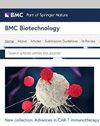Iron/Copper/Phosphate nanocomposite as antimicrobial, antisnail, and wheat growth-promoting agent
IF 3.5
3区 生物学
Q2 BIOTECHNOLOGY & APPLIED MICROBIOLOGY
引用次数: 0
Abstract
One of the current challenges is to secure wheat crop production to meet the increasing global food demand and to face the increase in its purchasing power. Therefore, the current study aimed to exploit a new synthesized nanocomposite to enhance wheat growth under both normal and drought regime. The effectiveness of this nanocomposite in improving the microbiological quality of irrigation water and inhibiting the snail’s growth was also assessed. Upon the employed one-step synthesis process, a spherical Fe/Cu/P nanocomposite was obtained with a mean particle size of 4.35 ± 1.524 nm. Cu2+, Fe2+, and P4+ were detected in the dried nanocomposite at 14.533 ± 0.176, 5.200 ± 0.208, and 34.167 ± 0.203 mg/ml concentration, respectively. This nanocomposite was found to exert antibacterial activity against Escherichia coli and Salmonella typhi. It caused good inhibition percent against Fusarium oxysporum (43.5 ± 1.47%) and reduced both its germination rate and germination efficiency. The lethal concentration 50 (LC50) of this nanocomposite against Lanistes carinatus snails was 76 ppm. The treated snails showed disturbance in their feeding habit and reached the prevention state. Significant histological changes were observed in snail digestive tract and male and female gonads. Drought stress on wheat’s growth was mitigated in response to 100 and 300 ppm treatments. An increase in all assessed growth parameters was reported, mainly in the case of 100 ppm treatment under both standard and drought regimes. Compared to control plants, this stimulative effect was accompanied by a 2.12-fold rise in mitotic index and a 3.2-fold increase in total chromosomal abnormalities. The finding of the current study could be employed to mitigate the effect of drought stress on wheat growth and to enhance the microbiological quality of irrigation water. This is due to the increased efficacy of the newly synthesized Fe/Cu/P nanocomposite against bacteria, fungi, and snails. This methodology exhibits potential for promoting sustainable wheat growth and water resource conservation.作为抗菌剂、抗蜗牛剂和小麦生长促进剂的铁/铜/磷酸盐纳米复合材料
当前的挑战之一是确保小麦作物生产,以满足日益增长的全球粮食需求,并应对其购买力的提高。因此,本研究旨在利用一种新合成的纳米复合材料来促进小麦在正常和干旱条件下的生长。研究还评估了这种纳米复合材料在改善灌溉水微生物质量和抑制蜗牛生长方面的效果。采用一步法合成工艺,获得了平均粒径为 4.35 ± 1.524 nm 的球形 Fe/Cu/P 纳米复合材料。在干燥的纳米复合材料中检测到的 Cu2+、Fe2+ 和 P4+ 浓度分别为 14.533 ± 0.176、5.200 ± 0.208 和 34.167 ± 0.203 mg/ml。该纳米复合材料对大肠杆菌和伤寒沙门氏菌具有抗菌活性。它对镰刀菌的抑制率(43.5 ± 1.47%)很高,并能降低其发芽率和发芽效率。该纳米复合材料对卡氏蜗牛(Lanistes carinatus)的致死浓度 50(LC50)为 76 ppm。经处理的蜗牛表现出摄食习性紊乱,并进入预防状态。在蜗牛消化道和雌雄性腺中观察到了显著的组织学变化。100 ppm 和 300 ppm 处理可减轻干旱对小麦生长的影响。据报告,在标准和干旱条件下,所有评估的生长参数都有所增加,主要是在 100 ppm 处理的情况下。与对照植物相比,有丝分裂指数提高了 2.12 倍,染色体异常总数增加了 3.2 倍。本研究的发现可用于减轻干旱胁迫对小麦生长的影响,并提高灌溉水的微生物质量。这是因为新合成的 Fe/Cu/P 纳米复合材料对细菌、真菌和蜗牛的功效增强了。该方法在促进小麦可持续生长和水资源保护方面具有潜力。
本文章由计算机程序翻译,如有差异,请以英文原文为准。
求助全文
约1分钟内获得全文
求助全文
来源期刊

BMC Biotechnology
工程技术-生物工程与应用微生物
CiteScore
6.60
自引率
0.00%
发文量
34
审稿时长
2 months
期刊介绍:
BMC Biotechnology is an open access, peer-reviewed journal that considers articles on the manipulation of biological macromolecules or organisms for use in experimental procedures, cellular and tissue engineering or in the pharmaceutical, agricultural biotechnology and allied industries.
 求助内容:
求助内容: 应助结果提醒方式:
应助结果提醒方式:


